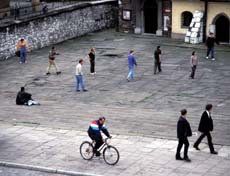Contested places

Fenced fields outside Charlottesville

Camera and bullet holes in Berlin

Synagogue square in Krakow
Doreen Massey describes the changes in our ideas if we stop thinking of places as neatly separated out by clear boundaries. No longer can a place be the site of "an authenticity, as singular, fixed and unproblematic in its identity."
[If we think of place] as formed out of social interrelations at all scales, then one view of a place is as a particular articulation of those relations, a particular moment in those networks of social relations and understandings. . . . It includes relations which stretch beyond -- the global as part of what constitutes the local, the outside as part of the inside. . . . The identities of place are always unfixed, contested and multiple. And the particularity of any place is, in these terms, constructed not by placing boundaries around it and defining its identity through counter-position to the other which lies beyond, but precisely (in part) through the specificity of the mix of links and interconnections to that "beyond". Places viewed in this way are open and porous. . . . All attempts to institute horizons, to establish boundaries, to secure the identity of places, can in this sense therefore be seen to be attempts to stabilize the meaning of particular envelopes of space-time. . . . such attempts . . . are constantly the site of social contest, battles over the power to label space-time, to impose the meaning to be attributed to a space, for however long or short a span of time. Massey 1994, 5
When the same area becomes a shared but contested place, it can become violent. Too few resources, too many memories. Maybe there can be a separation, but in physical space in our crowded world there is less and less unoccupied room in which the contestants can separate, and historical ties are deep.
Now, though, there are not only conflicts among particular identities, there are also conflicts between any particular identity and some kind of Totality, or at least a claimed totality. Conflicts that were difficult before become worse once the universal has turned predatory. It eats away particular identities, or so it is said. "It" is variously identified: the market, the flow of capital, the communications revolution, democracy, the flow of signifiers, the mediazed world of simulacra. Does this create a new universal place?